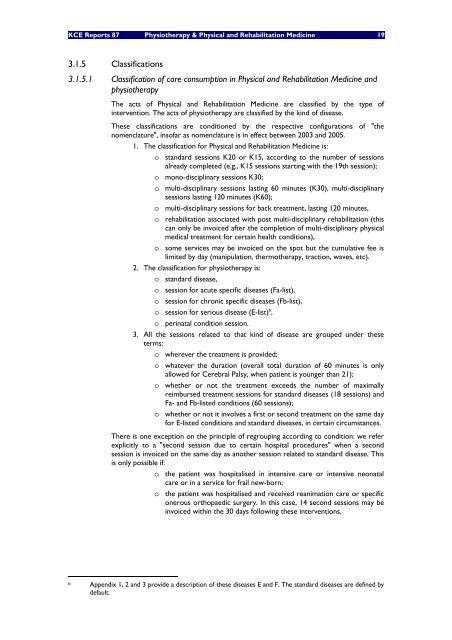Het gebruik van kinesitherapie en van fysische geneeskunde ... - KCE
Het gebruik van kinesitherapie en van fysische geneeskunde ... - KCE
Het gebruik van kinesitherapie en van fysische geneeskunde ... - KCE
You also want an ePaper? Increase the reach of your titles
YUMPU automatically turns print PDFs into web optimized ePapers that Google loves.
<strong>KCE</strong> Reports 87 Physiotherapy & Physical and Rehabilitation Medicine 19<br />
3.1.5 Classifications<br />
3.1.5.1 Classification of care consumption in Physical and Rehabilitation Medicine and<br />
physiotherapy<br />
The acts of Physical and Rehabilitation Medicine are classified by the type of<br />
interv<strong>en</strong>tion. The acts of physiotherapy are classified by the kind of disease.<br />
These classifications are conditioned by the respective configurations of "the<br />
nom<strong>en</strong>clature", insofar as nom<strong>en</strong>clature is in effect betwe<strong>en</strong> 2003 and 2005.<br />
1. The classification for Physical and Rehabilitation Medicine is:<br />
o standard sessions K20 or K15, according to the number of sessions<br />
already completed (e.g., K15 sessions starting with the 19th session);<br />
o mono-disciplinary sessions K30;<br />
o multi-disciplinary sessions lasting 60 minutes (K30), multi-disciplinary<br />
sessions lasting 120 minutes (K60);<br />
o multi-disciplinary sessions for back treatm<strong>en</strong>t, lasting 120 minutes,<br />
o rehabilitation associated with post multi-disciplinary rehabilitation (this<br />
can only be invoiced after the completion of multi-disciplinary physical<br />
medical treatm<strong>en</strong>t for certain health conditions),<br />
o some services may be invoiced on the spot but the cumulative fee is<br />
limited by day (manipulation, thermotherapy, traction, waves, etc).<br />
2. The classification for physiotherapy is:<br />
o standard disease,<br />
o session for acute specific diseases (Fa-list),<br />
o session for chronic specific diseases (Fb-list),<br />
o session for serious disease (E-list) b ,<br />
o perinatal condition session.<br />
3. All the sessions related to that kind of disease are grouped under these<br />
terms:<br />
o wherever the treatm<strong>en</strong>t is provided;<br />
o whatever the duration (overall total duration of 60 minutes is only<br />
allowed for Cerebral Palsy, wh<strong>en</strong> pati<strong>en</strong>t is younger than 21);<br />
o whether or not the treatm<strong>en</strong>t exceeds the number of maximally<br />
reimbursed treatm<strong>en</strong>t sessions for standard diseases (18 sessions) and<br />
Fa- and Fb-listed conditions (60 sessions);<br />
o whether or not it involves a first or second treatm<strong>en</strong>t on the same day<br />
for E-listed conditions and standard diseases, in certain circumstances.<br />
There is one exception on the principle of regrouping according to condition: we refer<br />
explicitly to a "second session due to certain hospital procedures" wh<strong>en</strong> a second<br />
session is invoiced on the same day as another session related to standard disease. This<br />
is only possible if:<br />
o the pati<strong>en</strong>t was hospitalised in int<strong>en</strong>sive care or int<strong>en</strong>sive neonatal<br />
care or in a service for frail new-born;<br />
o the pati<strong>en</strong>t was hospitalised and received reanimation care or specific<br />
onerous orthopaedic surgery. In this case, 14 second sessions may be<br />
invoiced within the 30 days following these interv<strong>en</strong>tions.<br />
b App<strong>en</strong>dix 1, 2 and 3 provide a description of these diseases E and F. The standard diseases are defined by<br />
default.

















